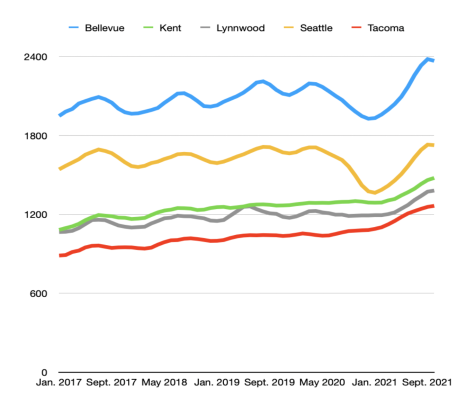Seattle eviction moratorium ends
Living costs in Seattle continue increasing as moratorium ends
March 9, 2022

With mask mandates beginning to lift in Washington, the reality of a post-pandemic world approaches. With this came the end of Seattle’s eviction moratorium on Monday, Feb. 28, 2022.
Since March 2020, Seattle renters have been protected by the moratorium banning evictions. In the moratorium’s terms provided by the City of Seattle, renters were still expected to pay rent, but if not possible, landlords had to work with their tenants to come up with more affordable payment plans during the pandemic. Landlords were also not allowed to evict tenants due to financial hardships, so long as tenants explained their situations.
Once the moratorium ends, the landlord may issue a 14-day notice for any rent balance that remains unpaid but may not charge fees for late or partial payments made during the moratorium. Landlords must also negotiate a reasonable payment plan for any late fees.
As COVID-19 cases showed an improvement, the city of Seattle decided to shift the priority of pandemic recovery to different areas.
“With COVID cases steadily declining, the time has come for the city to move on from the broad approach of the eviction moratoria and instead drive more deliberate and focused efforts to support those most in need,” Seattle Mayor Bruce Harrell said in an executive order on Feb. 11.
King County has been distributing millions of dollars of federal rental assistance to thousands of applicants seeking help.
With the economy on the rise, the cost of living in Seattle has also increased. Redfin’s market tracker report claims that Seattle’s average rent price rose 21% last year. In the pandemic, rent for new apartment leases in Seattle and Bellevue dropped. But starting in July 2021, rent climbed back up to the average before the pandemic.
Anh Tran is a fourth-year chemistry major and has lived off campus since he started attending Seattle Pacific University. Tran thinks the eviction ban was humane and helped support renters during the pandemic.
“For me, the moratorium eases the fear of being laid off,” Tran said. “I did not know what things would be like when the pandemic broke out. We just stayed home and we were not sure when we could come back to work.”
In the third year of the pandemic, communities and institutions alike feel the need to return to pre-pandemic standards.
“I think it makes sense now that everything starts to push back to normal,” Tran said. “The community would eventually develop immunity from the infection and make it a new normal.”
Seattle’s eviction moratorium has ensured many tenants affected by the pandemic still have a home to stay in during the crisis. For some college students who live away from home, the pandemic caused significant financial struggles.
Fourth-year economy major Kyra Strom shared that with Seattle’s living costs and rent increasing, having a moratorium in place supported renters to overcome the financial challenges.
“Removing the policy would be difficult for a lot of people, especially in the long run,” Strom said. “If you weren’t able to have those payments upfront, what are you going to do? Especially when living in Seattle is expensive with many extra costs, having the policy is to ensure that renters can pay rent at an appropriate time.”
After experiencing the pandemic’s uncertainty, Strom thinks the policy has provided security for many people when they’re financially recovering from the pandemic.
“I understand the policy may encourage unemployment,” Strom said. “But with the economy always being up and down, having the policy in place allows a lot more security for people. That way, people may be able to have a space to not stress about employment during their tough time.”


























































































